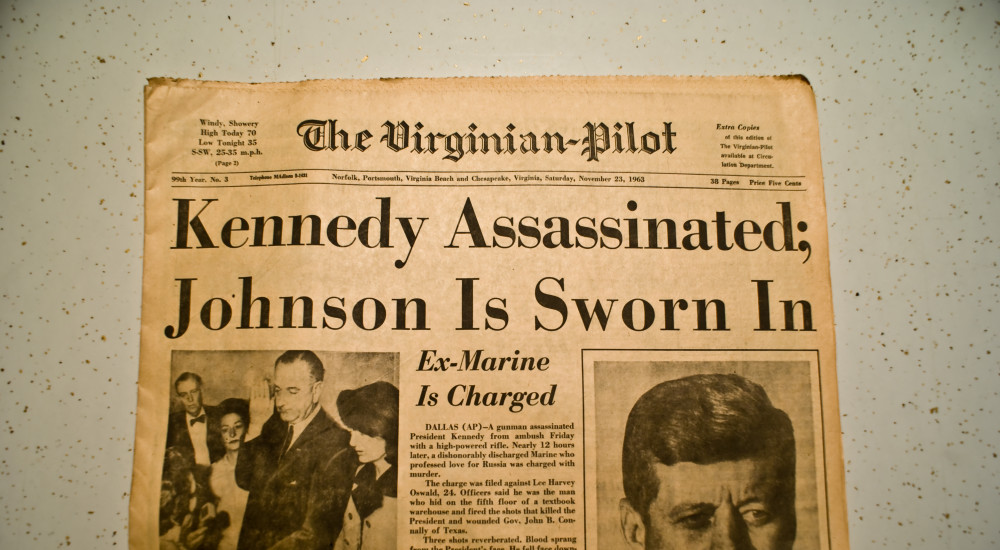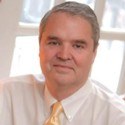11/22/63: Sudden and Slow Death
The assassination of John F. Kennedy 50 years ago is perhaps the most studied event in the history of civilization. Scores of scholars and amateurs have actually altered the direction of their lives – dropped whatever they were doing – in an attempt to discover for themselves the truth of what led up to, and what actually happened, that awful day in Dallas.
The one thing those who accept that Lee Harvey Oswald acted alone have in common with conspiracy theorists of various stripes – those who continue to argue that the hit was pulled off by the mob, CIA, FBI, Communists, anti-Communists, LBJ, the Secret Service, Dallas Police or even the latest claim, that the kill shot was accidentally fired by a rifle-toting secret service agent riding in the car behind JFK – is that Kennedy died almost instantly when the last bullet hit the bulls-eye.
But there was another death that day – one that was far slower and less obvious to the shocked onlookers at Dealey Plaza and around the globe. One that was not apparent for months, even years after that day in Dallas.
It was the death of liberalism.
You will undoubtedly say that many a liberal has come and gone since then, but the winsome brand of liberalism embodied by JFK – hopeful, forward-looking, inspirational, unabashedly pro-American and anti-Communist – began a rapid descent upon his death, supplanted by a leftist philosophy that has actively rejected the Kennedy legacy, and which has climaxed with the current president.
It is often said that greatness is by circumstance thrust upon those whom history has deemed great. JFK came to office at a time of both great peril and great opportunity. As is their want, historians disagree on his abbreviated legacy. But the Democratic presidents who followed have hardly left a trail of greatness. LBJ was hopelessly enveloped by Vietnam, declared a war on poverty which has failed, and retired a beaten man. Carter was in way over his head. Clinton was strictly a pragmatist. Obama will likely be defined only by his race, and by Obamacare, and we know where that is headed.
JFK possessed three critical traits that are now just distant memories on the American left – foreign policy realism, an economic philosophy that embraced the free market and lower taxes, and perhaps most importantly, a belief in American exceptionalism.
Kennedy actually campaigned in 1960 on a strong anti-Communist platform. While the Bay of Pigs was a disaster, it was certainly not because the president was insufficiently committed to taking down Fidel Castro, but because the young president was talked into the invasion of Cuba by advisors who failed to deliver what they promised. Refusing to be spooked by that failure, JFK went on to stare down Khrushchev in the Cuban Missile Crisis, when the world came to the brink of nuclear war. Kennedy recognized the evil and looming tyranny of Castro, which has tragically played out now for over five decades.
But the descent of liberal foreign policy realism was fully realized just over a decade later, when President Jimmy Carter actively minimized the threat of Soviet Communism, after which we witnessed the Soviet invasion of Afghanistan and the most massive buildup of Soviet forces around the globe in the 70 year history of that totalitarian state. Carter expressed shock.
While a precious few liberal foreign policy realists such as Hubert Humphrey remained after JFK’s death, one is hard pressed to find any who also believed in lower taxes.
One of the most quoted expressions regarding the efficacy of tax cuts is a rising tide lifts all boats. Did you know it was not Ronald Reagan or Barry Goldwater, but JFK who popularized that saying, and used it repeatedly? Who was the last “liberal” you can recall not only favoring, but investing substantial political capital in lowering taxes? Tough question. But one of Kennedy’s most significant domestic initiatives – finally achieved three months after his death – was an across-the-board, top-to-bottom cut in personal and corporate income taxes. And JFK’s stewardship of an economy in deep recession at the time of his inauguration led to an employment boom and soaring stock prices just as he was headed out on his fateful trip to Texas. Less than three years after his death, economic growth had reached over six percent and unemployment had dropped below four percent.
So while history reveals virtually zero liberals in the last 50 years who were foreign policy realists and tax cutters, that number would dip below zero, if that was possible, when it comes to a genuine belief in American exceptionalism,. That concept, now championed by tea party groups and their cohorts, is the bane of the left, now all in on fundamentally transforming America from the country presided over by John F. Kennedy to one embracing European-style social democracy.
Kennedy’s inspired oratory, aided by arguably the greatest speechwriter in history, Ted Sorenson, included this memorable quote from his inaugural address that spoke to both his foreign and domestic ideals : “Let every nation know, whether it wishes us well or ill, that we shall pay any price, bear any burden, meet any hardship, support any friend, oppose any foe, in order to assure the survival and the success of liberty.”1 These days, leftists avoid the word liberty like the plague. But JFK’s belief in America as an exceptional nation was what inspired his commitment to landing a man on the moon, saying America will commit to doing this “not because it is easy, but because it is hard.”
His “new frontier” was a call to America’s better angels, animated by the goals later adopted by LBJ with his “great society” but without the same pronounced degree of government intervention. He was late to the game on civil rights, but eventually exercised leadership when forced to by intransigent racist leaders in the deep south. And of course, his establishment of the Peace Corps became the embodiment of the most noble American ideals which inspired thousands to interrupt their lives and head overseas to try and make the world a better place.
In sharp contrast to JFK’s initiatives based on his implicit belief in America as exceptional, Barack Obama said “I believe in American exceptionalism, just as I suspect that the Brits believe in British exceptionalism, and the Greeks believe in Greek exceptionalism.”
In her first interview after her husband’s assassination, finally made public three years ago, Jackie Kennedy may have best encapsulated her husband’s legacy by describing him as “an idealist without illusions.”
It is true that any martyred leader, especially one who inspired people as Kennedy did, will forever be viewed through the prism of what he might have accomplished, as with his murdered brother RFK. The 35th president has become something of a Rorschach test, with people attaching to him the potential fulfillment of their own aspirations. But it is fair to say that the thousand days of Kennedy’s presidency provided sufficient evidence to support the assertion that he was a decidedly consequential president. And one who might have become a great president.
But one thing seems certain to myself and many like-minded observers. He was the last great liberal.
Tim Donner is a featured columnist for Bearing Drift.



